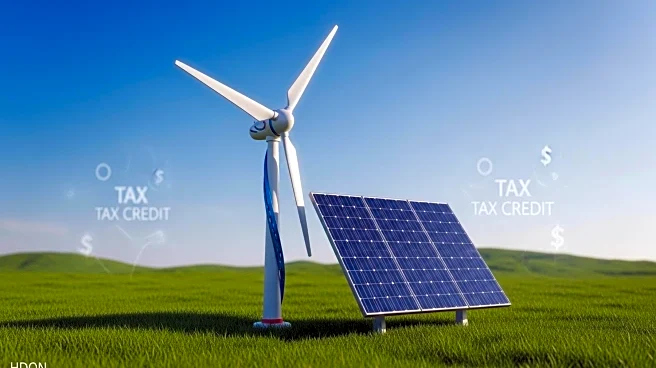What is the story about?
What's Happening?
Clean energy developers are seeking clarity from the Treasury Department regarding new Foreign Entity of Concern (FEOC) rules following the passage of the One Big Beautiful Bill Act. This legislation has altered the lifespan of clean energy tax credits initially established by the Inflation Reduction Act. The FEOC rules now apply to several tax credits, including the 45X advanced manufacturing credit, the 45Y production credit, and the 48E investment credit. These rules restrict entities with ties to countries like China, Russia, North Korea, or Iran from claiming certain tax credits. Industry experts express concerns over the complexity and potential legal risks associated with these rules, which could impact investment decisions and compliance costs.
Why It's Important?
The FEOC rules have significant implications for the clean energy sector, particularly in terms of investment and project development. The complexity of these rules may deter investors from pursuing certain tax credits, potentially shifting focus from solar to wind projects due to perceived risks. Smaller developers may face disadvantages due to limited resources for ensuring compliance with supply chain regulations. The broader impact includes potential delays in clean energy projects and increased legal and administrative burdens, which could affect the pace of the U.S. energy transition and efforts to meet climate goals.
What's Next?
The Treasury Department is expected to release additional guidance to clarify the FEOC rules, which could influence industry strategies and investment decisions. Developers are likely to accelerate project construction to meet deadlines and avoid new restrictions. The industry is also adapting to changes in the criteria for commencing construction, which may affect project timelines and financing strategies. Stakeholders will be closely monitoring the forthcoming guidance to assess its impact on compliance and investment risks.
Beyond the Headlines
The FEOC rules highlight the intersection of national security concerns with clean energy policy, reflecting broader geopolitical tensions. The emphasis on foreign ownership and licensing arrangements underscores the U.S. government's focus on reducing dependency on foreign entities in critical sectors. This development may lead to increased scrutiny of international partnerships and supply chains, potentially reshaping the landscape of global clean energy collaboration.
















